November 23, 2025 | 05:43 GMT +7
November 23, 2025 | 05:43 GMT +7
Hotline: 0913.378.918
November 23, 2025 | 05:43 GMT +7
Hotline: 0913.378.918
The VnSAT project helps form the coffee industry in the Central Highlands so that we can go far in a more sustainable way. The Ministry of Agriculture and Rural Development (MARD) will continue to promote the effectiveness of the VnSAT and a number of other sustainable coffee development projects. MARD will also boost logistics activities for the Central Highlands' coffee industry to create more added value, with more sophisticated and superior products than in the past, from there, building a product chain to increase the value of coffee.
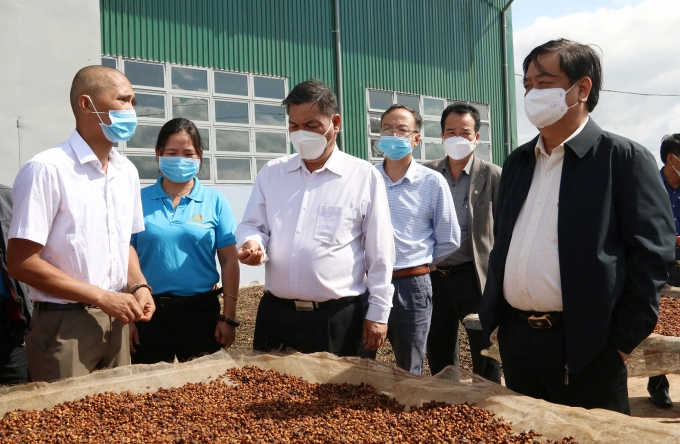
Minister Le Minh Hoan (right) visits Nam Yang Agricultural Cooperative (Gia Lai) in 2021. Photo: Minh Quy.
The VnSAT project has not only a meaningful effect on economic development such as increaing productivity and quality for the rice and coffee industries, but also improves and creates very positive changes for the environment and society. The World Bank regards VnSAT as a model project.
Through the VnSAT project, we have also determined that the production of rice and coffee in particular and other agricultural commodities in general must always be towards a sustainable development goal. We should not only increase productivity but also reduce production costs from which there will be an impact to better protect the environment, especially help reduce the use of fertilizers and plant protection drugs.
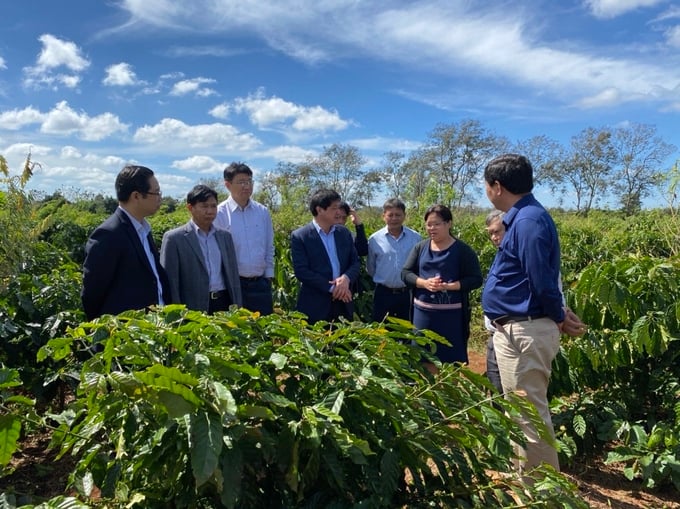
Deputy Minister Le Quoc Doanh (4th from left) visits the replanting coffee garden of the VnSAT project in the Central Highlands. Photo: Minh Hau.
The results achieved by the VnSAT project have had a great effect on the coffee industry and the local agricultural economy. In the coming time, it is necessary to speed up the construction of standard sustainable raw material areas. To do this, it is necessary to build and develop community agricultural extension groups, communicate and develop raw material areas, support and consult for the development of cooperatives, connect markets with farmers, promote chain linkage between enterprises with cooperatives and farmers in producing, processing and consuming coffee.
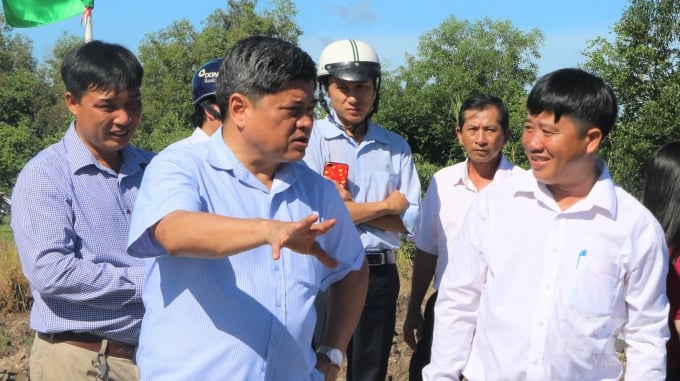
Deputy Minister Tran Thanh Nam attends an inauguration and handover ceremony in infrastructure invested by the VnSAT Project for rice farming cooperatives in the Mekong Delta. Photo: Le Hoang Vu.
Vietnam's experience in implementing the VnSAT Project for many years has created a very good premise for science and technology. The Project also has conducted many effective models, from small scale to large scale. Therefore, we can promote and multiply the building of large low-carbon rice fields. The goal is that we should build 600,000ha of low carbon rice among 1 million ha of high quality rice according to the target set by the MARD. MARD is proposed to launch a program on building large rice fields with low carbon emissions.
During its implementation, VnSAT Project has received a very specific and drastic leadership and direction of MARD and been under close coordination with localities, the business community, and cooperatives in coffee production in the Central Highlands and rice industry in the Mekong Delta.
In particular, the project has helped change local farming behavior thereby, helped reduce input costs and improved the competitiveness of the agricultural industry. The VnSAT Project has made a great contribution to supporting farmers, cooperatives and enterprises to create more standard and quality agricultural products and overcome technical barriers in importing countries.
The policy of shifting from agricultural production to agricultural economic development to form an ecological agriculture, modern countryside and smart farmers requires the whole political system, especially the agricultural and rural development sector, farmers and farmer organizations, cooperatives, businesses and local authorities to change their old perception of thinking into a new and modern one so that to possess adequate standards meeting domestic and export market demands.
The VnSAT Project is like a "new wind" to help farmers in the targeted regions 'go' in the right direction and save a lot of production costs. When the VnSAT Project ''set foot'' in Vietnam, in less than 10 years, the quality of rice in the Mekong Delta has completely "molted". Over 90% of exported rice is high-quality (previously 70 - 80% was low quality rice).
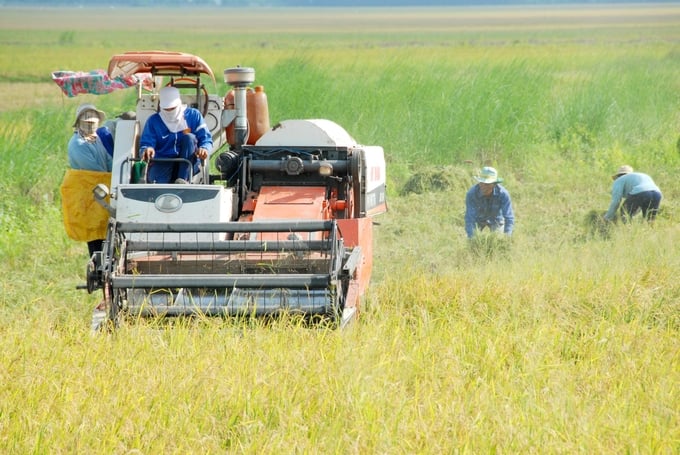
The results of the VnSAT Project have far exceeded expectations. Photo: Dao Chanh.
The success of the VnSAT Project has far exceeded initial expectations. In which, the biggest success is changing the habits and production behavior of farmers. Changing farmers' behavior is not easy. It can take centuries, not years to get success if following the old style. However, the VnSAT Project has done well, even better than expected.
After nearly 7 years of implementation, the VnSAT Project has changed the behavior and methods of sustainable rice production on a large scale. Through training on advanced rice farming procedures in the Mekong Delta, it has helped raise farmers' awareness in applying scientific and technical advances. The results and lessons learned from the VnSAT Project are not limited to Vietnam, but the WB will share them with other countries around the world. Countries will take Vietnam as a model to follow in their implementation process.
The WB will continue to discuss with the Government of Vietnam, especially the MARD, on continuing to replicate and further promote the effectiveness of the VnSAT Project. In particular, it will promote the reduction of greenhouse gas emissions according to the country's COP26 Summit commitment to achieve net zero emissions by 2050. Besides, if its results will continue to be promoted, the project will make a significant contribution to enhancing Vietnam's agricultural status in the world.
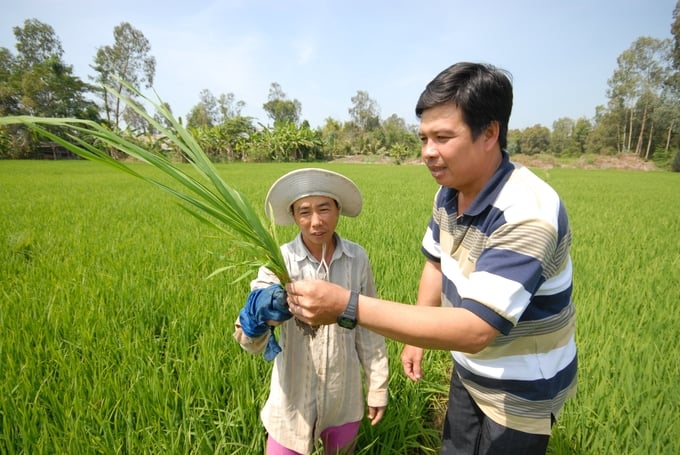
The VnSAT Project's successes have set an important foundation for Vietnam's agriculture to move further towards the goal of emission reduction in production. Photo: LHV.
Vietnam needs to continue researching and replicating to other industries. This is also an opportunity to prove that Vietnam's agricultural products are safe and do not cause many bad environmental indicators.
In addition, according to the VnSAT model, Vietnam can completely connect with carbon markets to sell 'carbon credits' to increase income and profit for locals.
Vietnam Agriculture Newspaper has always accompanied and stands side by side with the VnSAT in promoting knowledge and benefits brought by the Project. It plays an extremely important role in the project's success. When information about useful and good things are shared once, people may still have doubts, but if it comes many times, people will surely believe it. Even they may not take it serious immediately but will be curious to try. In addition, thanks to the media, people's trust in the project will grow bigger and bigger until it is big enough and the replication will be very fast.
In the next 10 years, if the communication work is well done with more appropriate policies and guidelines, the coverage of the project will not only stop at 1/10 of the Mekong Delta, but will expand to the entire region and spread widely across the country especially for the rice and coffee industries.
Communication activities through the mass media, especially the Vietnam Agriculture Newspaper, have been carried out for the VnSAT Project for 3 years (2020 - 2022) with hundreds of multimedia press products including news, articles, photos, radio broadcasts, news - TV reports, videos, clips, forums and talk shows in both Vietnamese and English languages. Thanks to the media, the project has attracted attention of millions of domestic and foreign readers and viewers. Communication activities have contributed to the widespread dissemination of the project, especially scientific and technical advances and results in changing people's behavior, promoting the restructuring of rice and coffee in particular, and Vietnamese agriculture in general.
Translated by Linh Nguyen

(VAN) Results from the Sustainable Durian Model Project in Dak Lak have confirmed the critical role of Yara Viet Nam in transferring advanced nutritional solutions to farmers.

(VAN) In Tuyen Quang province, livestock farmers have introduced effective models and innovative practices that significantly strengthen African Swine Fever prevention and control efforts.

(VAN) This is the study conducted by IRRI and Can Tho University on the rice straw value chain in Mekong Delta showing an economic potential of more than 6.6 trillion VND/year.

(VAN) By participating in cooperative economics, many farmers in Tay Ninh have overcome hardship, mastered clean dragon fruit cultivation techniques.

(VAN) The crossbreeding program in the former Binh Dinh province (now part of Gia Lai) has shown signs of decline, and urgent measures are needed to revive it and sustain past achievements.

(VAN) The agricultural sector agreed on a roadmap to pilot the MRV protocol and expand low-emission rice production from the 2025-2026 winter-spring crop.

(VAN) Agricultural extension officers in Quang Ninh do more than transmit knowledge; they have become a steadfast support system for farmers on the path to sustainable agricultural development.